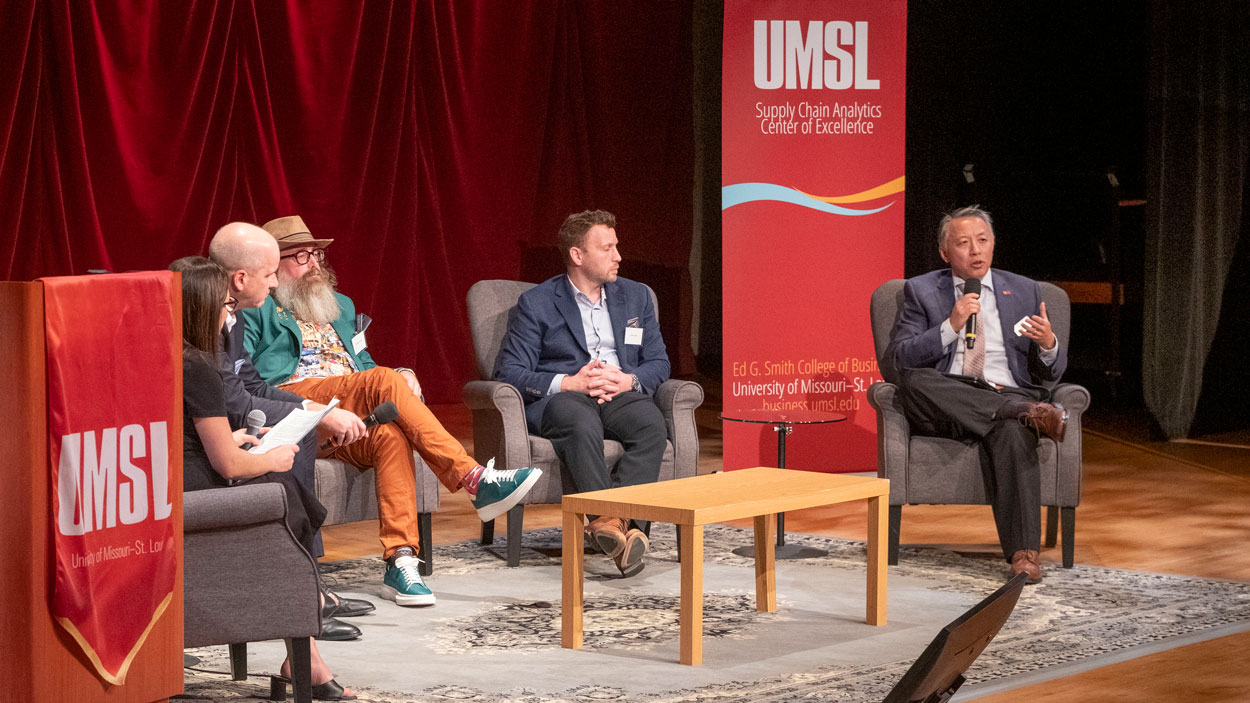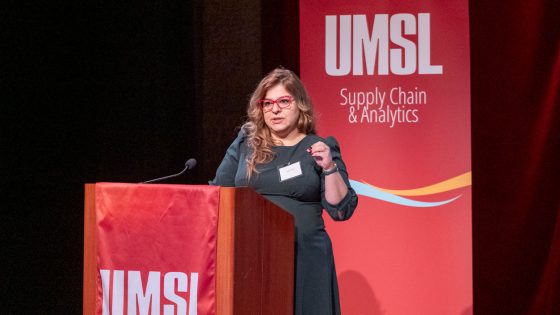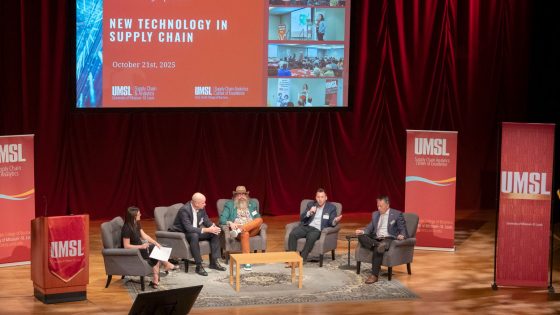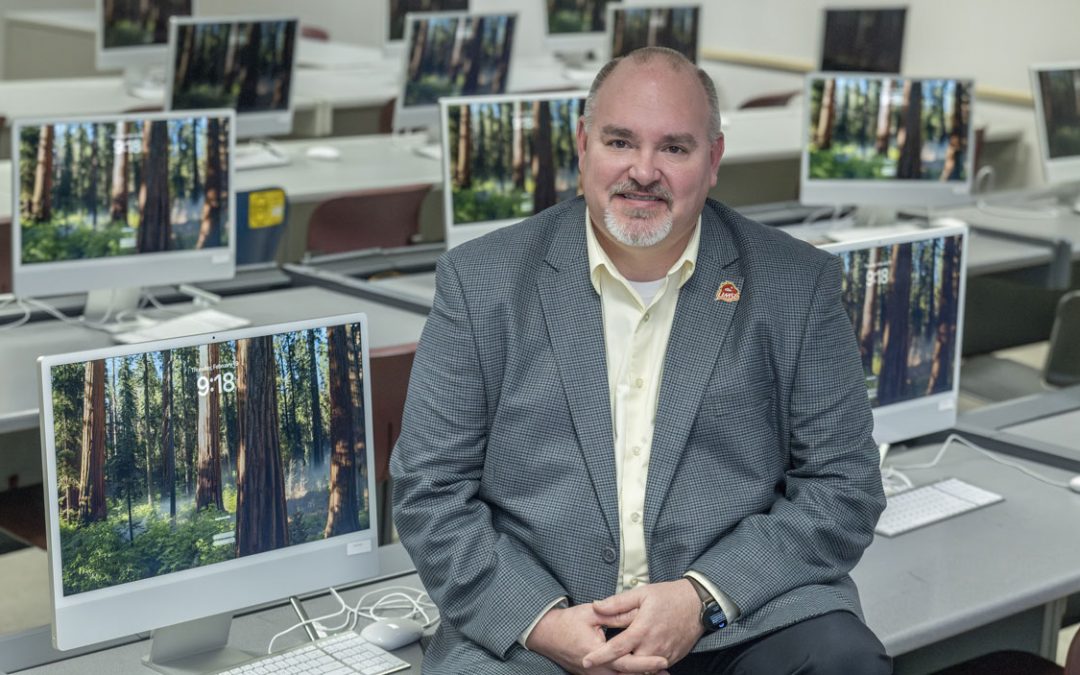
Haitao Li, the department chair, speaks as part of the final panel session of the 2025 Supply Chain and Analytics Research Symposium. He was joined on the stage by (from left) Jill Bernard Bracy, Brandon Wegge, Geoffrey Lakings and Jesse Lyman. (Photo by Derik Holtmann)
The sixth annual Supply Chain and Analytics Research Symposium featured a day full of presentations by industry leaders and academic experts, spread out through four sessions.
This year’s event, held in the E. Desmond and Mary Ann Lee Theater inside the Blanche M. Touhill Performing Arts Center on the campus of the University of Missouri–St. Louis, featured three significant firsts that reflect the growing impact that the Department of Supply Chain and Analytics is having on not just the local region, but the entire nation.
The most basic change was the venue; this was the first time the symposium moved into the Touhill Center, after previously being held in the Millennium Student Center’s Century Rooms. The audience was a mix of UMSL students and faculty members, as well as working professionals. This was also the first time the symposium featured industry professionals from outside of Missouri: Geoffrey Lakings of Rippling Nature and Jesse Lyman of Dizolv, both from Houston, Texas, were part of the final panel of the event.
“When we first started this event, our focus was on our faculty,” said Jill Bernard Bracy, who is an associate teaching professor and director of the Supply Chain Analytics Center of Excellence. “Then we expanded to include our advisory board, discussing regional issues. Now it’s growing even bigger, and I think that is because our reach is evolving. We’re not just a St. Louis entity. We’re not even just regional. We’re growing, and bringing speakers from other states illustrates that.”
For Lyman, the CEO and co-founder of Dizolv, this was his first trip to St. Louis. His Texas-based company provides compostable biopolymer substrates to manufacture sustainable, single-use products without harmful plastics. He had connected with Haitao Li, a professor and the Supply Chain department chair at UMSL, through his connection with Lakings. As beneficial as it was for the symposium to have Lyman at UMSL, it was just as beneficial to Lyman to visit a new region.
“Seeing the economy and the infrastructure and all the opportunities that are here in St. Louis was really eye-opening,” he said. “I’m in Houston, which from an industry standpoint and a subsidiary of oil and gas, makes a lot of sense. But from an innovation standpoint and from an agricultural standpoint, the amount of resources here is just unprecedented.”
The third first of this year’s symposium involves the setup of the sessions.
During last year’s event, UMSL Supply Chain Assistant Professor Trilce Encarnación presented with Mary Lamie, the executive vice president of Bi-State Development and head of the St. Louis Regional Freightway. Encarnación shared her research examining inland waterway freight challenges and opportunities, while Lamie offered her industry insights on an approach to fostering public/private partnerships to advance multimodal freight connectivity.
That pairing of industry and academia struck a chord with everyone in attendance.
“That went so well, and we had such great feedback,” Bracy said. “We thought, ‘Why don’t we do that for every session this time? We can partner an industry expert and an academic expert to bridge the gap between theory and practice and talk about our discipline from both perspectives.’ That was my favorite part of this year’s event. I thought it worked really well for every single topic. We’re working together and solving real-world problems.”
For the first session of the 2025 event, Makoto Yokoo, the vice president for North America Supply Chain and Logistics at Bunge, was paired with Li, UMSL’s department chair.
“We shared our perspectives and thoughts on the new technologies in supply chain analytics in the food and agriculture supply chain,” Li said. “I also shared some opportunities, along with the challenges we’re facing. For example, opportunities such as the use of drones, Internet of Things, sensors, 3D printing and Blockchain, and showcased two of my ongoing projects on vertical farming and decision-support for sensor-enabled poultry supply chain.”

Shakiba Enayati, an associate professor at UMSL, shares her research into the possibility of using drone technology to transport samples to determine organ transplant matches.
In the second session, Lauren Brenner and Nicole Mullins of Mid-America Transplant made a presentation about their work involving organ donations in the region – their network includes 124 hospital partners in Missouri, Illinois and Arkansas – and the time and financial challenges they face as it relates to safely and quickly transporting samples from areas such as Southwest Missouri to their testing facility in St. Louis. This step is essential for determining potential transplant matches.
Associate Professor Shakiba Enayati presented the research collaboration between UMSL and Mid-America Transplant, breaking down the differences in factors such as cost and time between traditional transportation modes – by vehicle or airplane – and the research they’ve done into using drones as the transport method. Her presentation included potential drone corridors, with waypoints and a battery-swap station in Rolla, midway between St. Louis and Springfield, Missouri.
“The drone is providing the best balance kind of solution,” Enayati told the audience in summation. “It’s fast enough to matter, it’s affordable enough to scale and it’s dependable enough to use for time-sensitive applications in this case.”

The 2025 Supply Chain and Analytics Research Symposium was held in the E. Desmond and Mary Ann Lee Theater at the Blanche M. Touhill Performing Arts Center for the first time, after previously meeting in the Millennium Student Center.
Encarnación and Mike Fritz, the director of engineered solutions at Sheer Logistics, had the third session of the day. Their presentation, titled “Reimagining Trucking: Innovation at the Wheel of Supply Chain,” was followed by a Q&A time, as were all the sessions. One of the goals of the symposium was, as always, to generate interaction with the audience, not just offer presentations.
The final session of the event was focused on creating impactful research between industry, academia and government entities. Lyman and Lakings presented on the collaborations between their two companies, with a focus on sustainability. Brandon Wegge, who had a long career as an engineer with Boeing, spoke about his work with Advanced Manufacturing Innovation Center St. Louis. The trio was joined by Li and Bracy for a panel-type discussion, with a Q&A following.
The presenters enjoyed the experience as much as the audience.
“It’s great that Professor Li is doing so much for us, so I asked myself how I can help him and what he’s trying to accomplish,” Lyman said. “There’s a lot of synergy there, and when he invited me, I was more than happy to be part of it and tell our story, to provide value to the best of my ability, as well as credit him for all the work that he’s been doing.”














